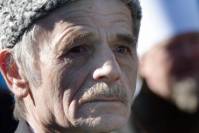• Topics / Deported peoples
• Topics / Human Rights Abuses in Russian-occupied Crimea
Russian Annexation – Crimean Tatar Tragedy. Mustafa Dzhemilev banned by Russian occupiers

Mustafa Dzhemilev , Ukrainian MP, former head of the Mejlis of the Crimean Tatar People and veteran leader of the Crimean Tatar rights movement, has been presented with a document banning his entry to the Russian Federation. This, according to Moscow and the puppet government installed in Simferopol includes Crimea. The move coincides with measures to prevent broadcasts with Dzhemilev, the current head of the Mejlis, Refat Chubarov, and other Mejlis representatives on Crimean radio and television. It comes less than a month before the seventieth anniversary of the Deportation of the Crimean Tatar People and demonstrates how well-founded Crimean Tatar fears of Russian occupation of Crimea were.
The document was handed to Dzhemilev as he and the deputy head of the Mejlis, Aslan Omer Kirimli left the Crimea for Kyiv. It calls Mustafa Dzhemilev a “foreign national”, a citizen of Ukraine and bans him from entering the Russian Federation up till April 19, 2019. Dzhemilev commented that although representatives of many authoritative international organizations and diplomats had been stopped from entering the Crimea in recent months, this move is something entirely different. He calls it an indicator of the kind of “civilized” country we are dealing with and adds that he will come to the Crimea regardless of any bans.
Mustafa Dzhemilev had only arrived in the Crimea on Saturday for the first time since armed Russian soldiers seized government buildings in Simferopol on Feb 27. He and Chubarov were initially held at the border into the Crimea by men with rifles who claimed that they had been declared persona non grata. They were finally allowed through, with Dzhemilev who had not been in the Crimea since the invasion receiving a warm welcome en route.
In Simferopol Dzhemilev noticed that for the first time the Ukrainian flag was not flying over the Mejlis building and ordered it to be reinstated. This led first to a visitation from the police who demanded that it be removed since it could cause “provocation and attacks on the building”. Under the puppet regime of Sergei Aksenov this proved to be a promise and on Monday morning three women present in the building were injured when around 40 “Crimean self-defence” thugs burst in and removed the flag. It was later reinstated.
A little earlier, Lilia Muslimova, press secretary for the Mejlis (and one of the three women injured) cited sources in the State-owned Crimean Radio and TV broadcasting company Krym as saying that staff had been instructed to avoid taking interviews with Dzhemilev , Chubarov and other members of the Mejlis or generally providing information about them. The chief editor of the Crimean Tatar programme on TV Krym, Shevket Ganiev and the director of this programme have also been removed.
There have been many reports over these last months of Crimean Tatars being asked when they are leaving. At more official levels Crimean Tatars have been placed under immense pressure to accept Russian citizenship. They, and the international community, were assured that their rights would be fully respected under Russian rule. These latest events make their distrust understandable.
Mustafa Dzhemilev was just 6 months old in May 1944 when his family and more than 200 thousand Crimean Tatars were forced to leave their homes. Nearly half died during the Deportation and in the first two years of exile. He has now been told that he is a “foreign national” and cannot enter his homeland
On April 21 Russian president Vladimir Putin signed a decree on the “rehabilitation of the Crimean Tatar population and other ethnic groups of the Crimea who suffered from repression.” The decree sets out measures for the “socio-economic development of some territories”.
Whatever Putin’s objective in taking this measure, the last words sound positively menacing. As reported, Aksyonov’s deputy, Ruslan Temirgaliyev announced almost immediately after the takeover that they would be “asking” Crimean Tatars to vacate land supposedly required "for social needs".
This decree comes a couple of weeks after the publication of a new “Crimean constitution” drawn up following the Russian annexation behind closed doors. The Crimean Tatar response was swift and negative. This “constitution” contains no recognition of their status as indigenous people. The document does not contain any norms guaranteeing the participation of the Crimean Tatars in public life, nor are there the previously promised 20% quotas of positions within government.
Mustafa Dzhemilev called Putin’s decree a political step aimed at strengthening Russian policy in the Crimea and said that the Crimean Tatars do not need “rehabilitation” from Russia. On the contrary, Russia should rehabilitate itself before them for the crime committed in 1944. He adds that such a step is clearly belated. Russia should have declared back in 1991 that the Deportation had been a crime and taken on the commitment to help Crimean Tatars return. “Why have they decided to issue this decree now after occupying our territory?”, he asks.
If Putin genuinely wished to demonstrate that the Crimean Tatars have nothing to fear under Russian rule, he should have organized proper legislation recognizing the Crimean Tatars as an indigenous people and setting out real guarantees for their rights. Inserting a puppet government who use thugs prepared to beat up women to pull down a flag, introduce repressive measures and ban Crimean Tatars from their homeland is a rotten way to begin.





